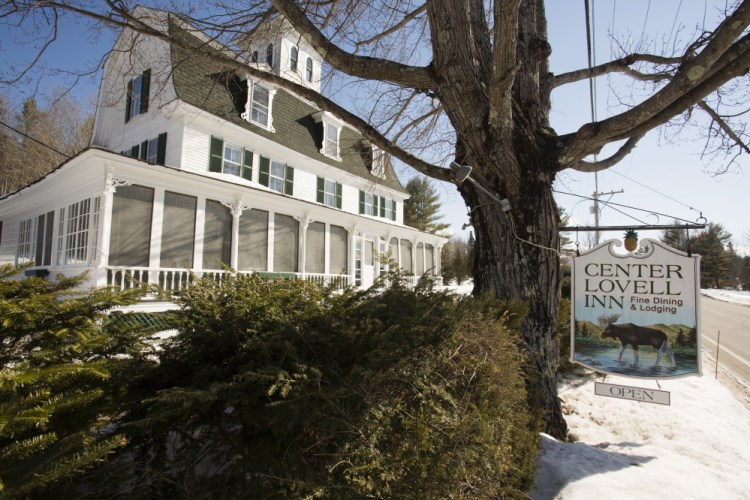The highly publicized essay contest to win the Center Lovell Inn & Restaurant did not violate state gaming laws, according to an investigation by the Maine State Police, but some of the unsuccessful entrants remain skeptical.
Sgt. Michael Johnston of the state police Special Investigations Unit said the investigation included a review of the contest rules as well as interviews with the current and future owners of the inn, Janice Sage and Prince Adams, along with the two judges who reviewed the essays and picked the winner.
“We determined it was clearly a game of skill and it was conducted in accordance with the rules that were set out prior to the contest,” Johnston said Tuesday. “There was no predetermination of a winner.”
The property has seven guest rooms and views of the White Mountains and Kezar Lake. Sage held the 200-word essay contest to determine the next owner of the inn and restaurant and to fund her retirement. She sought to receive at least 7,500 entries, charging $125 each, which would yield $937,500.
Investigators reviewed 15 complaints they received about the contest from contestants who did not win and were skeptical that the winning essay was really the best. The contestants also questioned whether a prior relationship might have existed between Sage, 68, and Adams, who already runs a restaurant in the U.S. Virgin Islands.
“We found no evidence there was any connection between them,” Johnston said of Sage and Adams. That conclusion was based on separate interviews with both of them, he said. Police did not have probable cause that a crime had been committed, a standard that would have been necessary for a more intrusive examination that would merit subpoenaing telephone records, he said.
Sage did not respond to a telephone message left at the inn Tuesday. She has not responded to several attempts to reach her over the past few weeks, and a neighbor last week said she had not seen Sage at the inn in several days.
Johnston said the judges “did exist. They were real people,” and both were interviewed. He said he was unaware of any special credentials they had for judging the essay contest, but that was not a requirement.
“There is no state certification for judging an essay contest,” Johnston said. “They certainly appeared to be honest and credible people.”
Johnston would not identify the judges or release any other information about them, nor would he release written results of the investigation.
The Maine Attorney General’s Office reviewed the results of the state police investigation and determined there was no violation of the state’s consumer protection laws.
The Special Investigations Unit regulates games of chance, such as bingo, which outside of licensed casinos can only be operated by nonprofit, community or fraternal organizations. Johnston assigned veteran state police gaming inspector Barry Hathaway to the investigation.
A game of chance is any contest in which a person risks something of his own for a chance to win something of value and the outcome isn’t determined by skill.
When Sage acquired the inn by winning an essay contest in 1993, the state also reviewed complaints then and found no improprieties.
Cortney Potts, a contestant from Nebraska and spokeswoman for a Facebook group that was critical of the competition, said she received a call from the state police inspector Monday but he did not clear up some vexing issues.
“I was asking specific questions we hadn’t gotten answers to: Who the judges were and whether they were qualified to judge a contest,” Potts said Tuesday. “We still feel there was an enormous amount of problems that went on with this competition.”
The group has about 200 members, some of whom are supporters but not entrants.
Potts said the group wanted to make sure the matter was looked at in “a thorough manner, which we don’t believe the state police have done.”
Some members of the group have taken the additional step of filing a complaint with the Federal Trade Commission.
Criticisms of the contest include the fact that the property did not have 12 acres as advertised, although neighboring parcels are reportedly going to be added to it in the aftermath of the contest. There apparently is also a mortgage on the property that was to be paid off with contest proceeds, Potts said.
According to Potts, the contest was also purportedly held to give the inn to someone who might not be able to afford a restaurant. Potts is a single mother who works as a chef in Nebraska. The winner and the first runner-up already own restaurants, she said.
“I can understand why you want someone like that to take over your business, but advertising to people like me is kind of sketchy,” she said. “It’s people like me that $125 hurts the most.”
About 10 percent of the people in the Facebook group complained that they mailed money orders or cashier’s checks with their essay and received no numbered ticket stub indicating that their entry was received and logged, she said.
The state police said none of those complaints was within their purview to investigate, according to Potts.
On Monday, authorities contacted each of the complainants to inform them of the investigation’s conclusions. Most were appreciative of the inquiry and the response, though some were still disappointed and frustrated, Johnston said.
He said the investigation did not involve reading any of the essays.
Send questions/comments to the editors.


